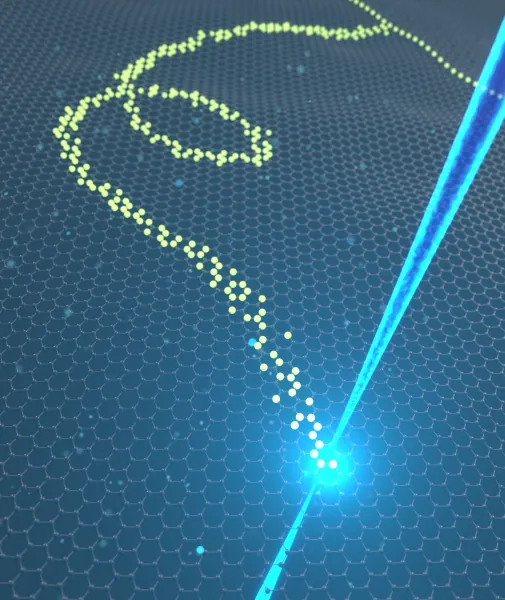
The Rising Threat of GPS Spoofing: How Spirent is Paving the Way for Safer Navigation
2024-10-01
Author: Yu
In an era where global navigation technologies are vital for the aviation industry, UK-based telecommunications testing company Spirent is stepping up to combat the alarming rise in GPS spoofing. Initially, their advanced spoof detection and alerting software will be implemented in civil aircraft cockpits on mobile devices, yet the company's ambitions extend far beyond that. Spirent aims to collaborate with avionics manufacturers to develop certified equipment and partner with air navigation service providers to enhance their detection capabilities regarding Global Navigation Satellite System (GNSS) spoofing.
Jeremy Bennington, the vice president of precision navigation and timing (PNT) at Spirent, leads these initiatives from his home office in Utah. Serving a vast clientele of around 1,500 in diverse fields such as aerospace, defense, and government across all five continents, Spirent is on the cusp of launching its new spoofing detection service, which is already deemed mature in its development.
According to Bennington, the threat posed by GNSS spoofing is not just limited to conflict zones; he warns that “the issue of GPS integrity will only grow more significant in the coming decades.” He has been actively giving presentations about this threat to a range of influential bodies, including airline associations, pilot unions, and regulatory institutions like the FAA and the European air traffic management organization EUROCONTROL.
An Invisible Danger
Every day, hundreds of incidents of GPS spoofing occur, impacting both airline flights and business jets. To tackle this, Spirent plans to detect and map areas where spoofing happens, which would then be represented on mobile device aeronautical charts for improved situational awareness among pilots.
Spirent’s system will integrate with cockpit mobile apps to provide crucial data about potential spoofing. Although certified avionics development may take years, the company is committed to working with avionics manufacturers to support the creation of dependable equipment that can withstand these emerging threats. Spirent will also leverage ADS-B data to bolster accurate spoofing detection.
Bennington characterizes spoofing as “insidious,” where deceptive GPS signals mislead cockpit navigation systems to portray incorrect positions—a significant safety hazard. He highlights various spoofing techniques, one being 'circle spoofing,' where aircraft positions are artificially altered to appear near airports, thus misleading navigation systems.
Under the Microscope: Testing and Innovations
To combat the rising threat of spoofing, Spirent is utilizing its state-of-the-art research laboratories, which possess exceptional capabilities for testing GNSS jamming. The company’s advanced testing solutions cater to mission-critical military systems, gearing up to counteract navigation warfare.
Leveraging anechoic chambers and open sky testing ranges, Spirent is meticulously studying how to alert aircrews to potential spoofing attacks and develop strategies for mitigation. Furthermore, Spirent is working alongside Low Earth Orbit (LEO) satellite firms, as advancements in satellite communication could play a crucial role in future navigation solutions.
As the European Space Agency and other entities work toward developing LEO signals for navigation, Bennington notes that successful certification of signals, such as those from Elon Musk's Starlink, could create new opportunities for reliable GNSS alternatives.
Key Innovations for the Future of Aviation
Spirent’s innovative GNSS Foresight cloud-based service stands at the forefront of safely guiding uncrewed vehicles and drones beyond visual lines of sight (BVLOS). By providing 3D maps and predictive analytics of GNSS signal reception, the service enables operators to navigate safely in complicated urban environments with frequent signal obstructions.
However, the industrial challenge remains significant—aircraft equipped only with GPS systems face dire risks of falling prey to spoofing. When GPS failures occur, pilots may revert to other navigation aids or systems—yet the unavailability of accurate INS (Inertial Navigation Systems) information complicates matters.
Bennington outlines the development roadmap for the aviation community, aiming to establish awareness of spoofing incidents, implement avoidance tactics, and ultimately enhance avionics and navigation solutions that integrate LEO satellite technology.
Despite the absence of a current robust defense against GPS spoofing, Spirent is adopting a proactive approach. By mapping spoofing zones for pilots and monitoring flight tracks to identify anomalies caused by deception, the company can create tools to help aviation professionals recognize and react to this burgeoning menace.
As the risks posed by GPS spoofing become increasingly critical, Spirent is emerging as a crucial player in the quest for aerial safety, promising advancements that may redefine how we navigate the skies. The future of flight may well depend on navigating these treacherous waters with innovation and vigilance.

 Brasil (PT)
Brasil (PT)
 Canada (EN)
Canada (EN)
 Chile (ES)
Chile (ES)
 España (ES)
España (ES)
 France (FR)
France (FR)
 Hong Kong (EN)
Hong Kong (EN)
 Italia (IT)
Italia (IT)
 日本 (JA)
日本 (JA)
 Magyarország (HU)
Magyarország (HU)
 Norge (NO)
Norge (NO)
 Polska (PL)
Polska (PL)
 Schweiz (DE)
Schweiz (DE)
 Singapore (EN)
Singapore (EN)
 Sverige (SV)
Sverige (SV)
 Suomi (FI)
Suomi (FI)
 Türkiye (TR)
Türkiye (TR)